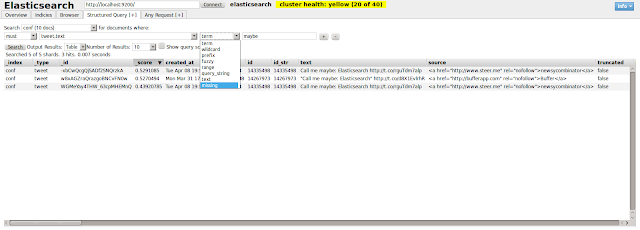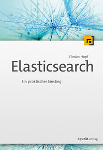I only recently noticed that Sense, the Chrome Plugin for Elasticsearch has been pulled from the app store by its creator. There are quite strong opinions in this thread and I would like to have Sense as a Chrome plugin as well. But I am also totally fine with Elasticsearch as a company trying to monetize some of its products so that is maybe something we just have to accept. What is interesting is that it isn't even possible to fork the project and keep developing it as there is no explicit license in the repo. I guess there is a lesson buried somewhere in here.
In this post I would like to look at some of the alternatives for interacting with Elasticsearch. Though the good thing about Sense is that it is independent from the Elasticsearch installation we are looking at plugins here. It might be possible to use some of them without installing them in Elasticsearch but I didn't really try. The plugins are generally doing more things but I am looking at the REST capabilities only.
Marvel
Marvel is the commercial plugin by Elasticsearch (free for development purposes). Though it does lots of additional things, it contains the new version of Sense. Marvel will track lots of the state and interaction with Elasticsearch in a seperate index so be aware that it might store quite some data. Also of course you need to respect the license; when using it on a production system you need to pay.
The main Marvel dashboard, which is Kibana, is available at http://localhost:9200/_plugin/marvel. Sense can be accessed directly using http://localhost:9200/_plugin/marvel/sense/index.html.
The Sense version of Marvel behaves exactly like the one you are used from the Chrome plugin. It has highlighting, autocompletion (even for new features), the history and the formatting.
elasticsearch-head
elasticsearch-head seems to be one of the oldest plugins available for Elasticsearch and it is recommended a lot. The main dashboard is available at http://localhost:9200/_plugin/head/ which contains the cluster overview.
There is an interface for building queries at the Structured Query tab./p>
It lets you execute queries by selecting values from dropdown boxes and it can even detect fields that are available for the index and type. Results are displayed in a table. Unfortunately the values that can be selected are rather outdated. Instead of the match query it still contains the text query that is deprecated since Elasticsearch 0.19.9 and is not available anymore with newer versions of Elasticsearch.
Another interface on the Any Request tab lets you execute custom requests.
The text box that accepts the body has no highlighting and it is not possble to use tabs but errors will be displayed, the response is formatted, links are set and you do have the option to use a table or the JSON format for responses. The history lets you execute older queries.
There are other options like Result Transformer that sound interesting but I have never tried those.
elasticsearch-kopf
elasticsearch-kopf is a clone of elasticsearch-head that also provides an interface to send arbitrary requests to Elasticsearch.
You can enter queries and let them be executed for you. There is a request history, you have highlighting and you can format the request document but unfortunately the interface is missing a autocompletion.
If you'd like to learn more about elasticsearch-kopf I have recently published a tour through its features.
Inquisitor
Inquisitor is a tool to help you understand Elasticsearch queries. Besides other options it allows you to execute search queries.
Index and type can be chosen from the ones available in the cluster. There is no formatting in the query field, you can't even use tabs for indentation, but errors in your query are displayed in the panel on top of the results while typing. The response is displayed in a table, matching fields are automatically highlighted. Because of the limited possibilites when entering text the plugin seems to be more useful when it comes to the analyzing part or for pasting existing queries
Elastic-Hammer
Andrew Cholakian, the author of Exploring Elasticsearch, has published another query tool, Elastic-Hammer. It can either be installed locally or used as an online version directly.
It is a quite useful query tool that will display syntactic errors in your query and format images and links in a pretty response. It even offers autocompletion though not as elaborated as the one Sense and Marvel are providing: It will display any allowed term, no matter the context. So you can't really see which terms currently are allowed but only that the term is allowed at all. Nevertheless this can be useful. Searches can also be saved in local storage and executed again.
Conclusion
Currently none of the free and open source plugins seems to provide an interface that is as good as the one contained in Sense and Marvel. As Marvel is free for development you can still use but you need to install it in the instances again. Sense was more convenient and easier to start but I guess one can get along with Marvel the same way.
Finally I wouldn't be surprised if someone from the very active Elasticsearch community comes up with another tool that can take the place of Sense again.
About Florian Hopf
I am working as a freelance software developer and consultant in Karlsruhe, Germany and have written a German book about Elasticsearch. If you liked this post you can follow me on Twitter or subscribe to my feed to get notified of new posts. If you think I could help you and your company and you'd like to work with me please contact me directly.













Sense is back as an app in Kibana 4.2 :) https://www.elastic.co/blog/sense-2-0-0-beta1
AntwortenLöschenso I need to install kibana and create yet another port and server just to access sense??
Löschen